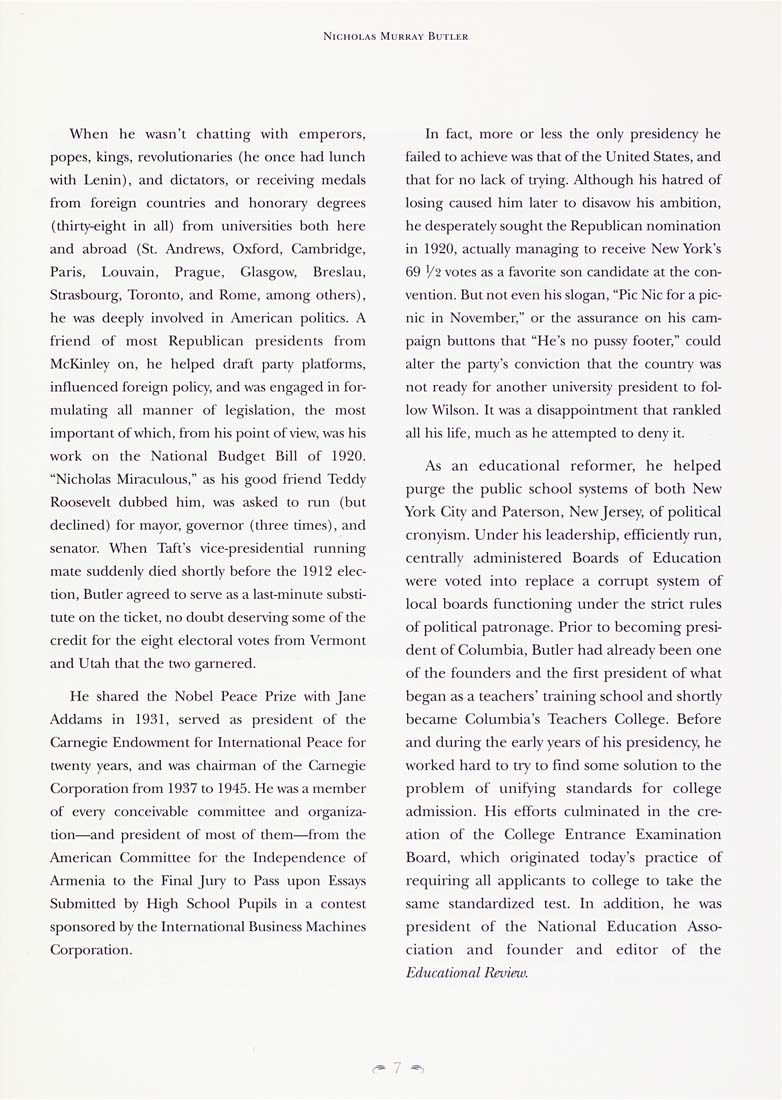Columbia Library columns (v.44(1995))
(New York : Friends of the Columbia Libraries. )
|
||
|
|
|
|
| v.44,no.2(1995:Autumn): Page 7 |

Nicholas Murray Butler When he wasn't chatting with emperors, popes, kings, revolutionaries (he once had lunch with Lenin), and dictators, or receiving medals from foreign countries and honorary degrees (thirty-eight in all) from universities both here and abroad (St Andrews, Oxford, Cambridge, Paris, Louvain, Prague, Glasgow. Breslau, Strasbourg, Toronto, and Rome, among others), he was deeply involved in American politics. A friend of most Republican presidents from McKinley on, he helped draft party platforms, influenced foreign policy, and was engaged in for¬ mulating all manner of legislation, the most important of which, from his point of view, was his work on the National Budget Bill of 1920. "Nicholas Miraculous," as his good friend Teddy Roosevelt dubbed him, was asked to run (but declined) for mayor, governor (three times), and senator. When Taft's vice-presidential running mate suddenly died shortly before the 1912 elec¬ tion, Butier agreed to serve as a last-minute substi¬ tute on the ticket, no doubt deserving some of the credit for the eight electoral votes from Vermont and Utah that the two garnered. He shared the Nobel Peace Prize with Jane Addams in 1931, served as president of the Carnegie Endowment for International Peace for twenty years, and was chairman of the Carnegie Corporation from 1937 to 1945. He was a member of every conceivable committee and organiza¬ tion—and president of most of them—from the American Committee for the Independence of Armenia to the Final Jury to Pass upon Essays Submitted by High School Pupils in a contest sponsored by the International Business Machines Corporation. In fact, more or less the only presidency he failed to achieve was that of the United States, and that for no lack of trying. Although his hatred of losing caused him later to disavow his ambition, he desperately sought the Republican nomination in 1920, actually managing to receive New York's 69 Vs votes as a favorite son candidate at the con¬ vention. But not even his slogan, "Pic Nic for a pic¬ nic in November," or the assurance on his cam¬ paign buttons that "He's no pussy footer," could alter the party's conviction that the country was not ready for another university president to fol¬ low Wilson. It was a disappointment that rankled all his life, much as he attempted to deny it. As an educational reformer, he helped purge the public school systems of both New York City and Paterson, New Jersey, of political cronyism. Under his leadership, efficiendy run, centrally administered Boards of Education were voted into replace a corrupt system of local boards functioning under the strict rules of political patronage. Prior to becoming presi¬ dent of Columbia, Butler had already been one of the founders and the first president of what began as a teachers' training school and shordy became Columbia's Teachers College. Before and during the early years of his presidency, he worked hard to try to find some solution to the problem of unifying standards for college admission. His efforts culminated in the cre¬ ation of the College Entrance Examination Board, which originated today's practice of requiring all applicants to college to take the same standardized test. In addition, he was president of the National Education Asso¬ ciation and founder and editor of the Educational Review. ^ 7 ^ |
| v.44,no.2(1995:Autumn): Page 7 |







